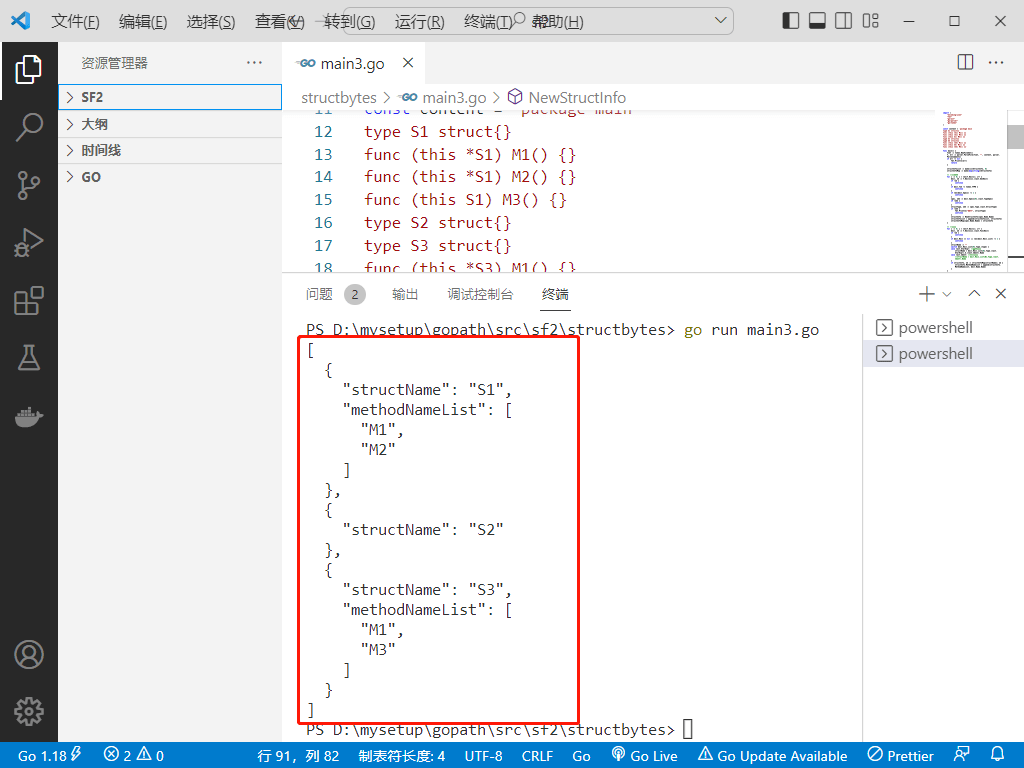2022-11-13:以下go语言代码中,如何获取结构体列表以及结构体内的指针方法列表?
2022-11-13:以下go语言代码中,如何获取结构体列表以及结构体内的指针方法列表?以下代码应该返回{“S1”:[“M1”,”M2”],”S2”:[],”S3”:[“M1”,”M3”]},顺序不限。S1的M3方法不是指针方法,S3的M2方法也不是指针方法,所以不能输出。
package main
type S1 struct{}
func (this *S1) M1() {}
func (this *S1) M2() {}
func (this S1) M3() {}
type S2 struct{}
type S3 struct{}
func (this *S3) M1() {}
func (this S3) M2() {}
func (this *S3) M3() {}答案2022-11-13:
这道题有人说用反射,实际上反射是无法解决这个问题的,原因是无法直接使用结构体。
要解析rust的代码,go/ast、go/parser、go/token,要用到这三个包。
使用场景是写框架。
代码用go语言编写。代码如下:
package main
import (
"encoding/json"
"fmt"
"go/ast"
"go/parser"
"go/token"
)
const content = `package main
type S1 struct{}
func (this *S1) M1() {}
func (this *S1) M2() {}
func (this S1) M3() {}
type S2 struct{}
type S3 struct{}
func (this *S3) M1() {}
func (this S3) M2() {}
func (this *S3) M3() {}`
func main() {
fset := token.NewFileSet()
f, err := parser.ParseFile(fset, "", content, parser.ParseComments)
if err != nil {
fmt.Println(err)
return
}
structInfoList := make([]*StructInfo, 0)
structInfoMap := make(map[string]*StructInfo)
// 找结构体
for i := 0; i < len(f.Decls); i++ {
decl, ok := f.Decls[i].(*ast.GenDecl)
if !ok {
continue
}
if decl.Tok != token.TYPE {
continue
}
if len(decl.Specs) != 1 {
continue
}
spec, ok2 := decl.Specs[0].(*ast.TypeSpec)
if !ok2 {
continue
}
structType, ok3 := spec.Type.(*ast.StructType)
if !ok3 {
fmt.Println("失败", structType)
continue
}
structInfo := NewStructInfo(spec.Name.Name)
structInfoList = append(structInfoList, structInfo)
structInfoMap[spec.Name.Name] = structInfo
}
// 找方法
for i := 0; i < len(f.Decls); i++ {
decl, ok := f.Decls[i].(*ast.FuncDecl)
if !ok {
continue
}
if decl.Recv == nil || len(decl.Recv.List) != 1 {
continue
}
structName := ""
switch decl.Recv.List[0].Type.(type) {
case *ast.StarExpr: //指针方法
structName = decl.Recv.List[0].Type.(*ast.StarExpr).X.(*ast.Ident).Name
case *ast.Ident: //普通方法
//structName = decl.Recv.List[0].Type.(*ast.Ident).Name
}
if structInfo, ok := structInfoMap[structName]; ok {
structInfo.MethodNameList = append(structInfo.MethodNameList, decl.Name.Name)
}
}
// 输出
data, _ := json.MarshalIndent(structInfoList, "", " ")
fmt.Println(string(data))
}
type StructInfo struct {
StructName string `json:"structName,omitempty"`
MethodNameList []string `json:"methodNameList,omitempty"`
}
func NewStructInfo(structName string) *StructInfo {
return &StructInfo{StructName: structName, MethodNameList: make([]string, 0)}
}
执行结果如下:

本作品采用《CC 协议》,转载必须注明作者和本文链接



 关于 LearnKu
关于 LearnKu




推荐文章: